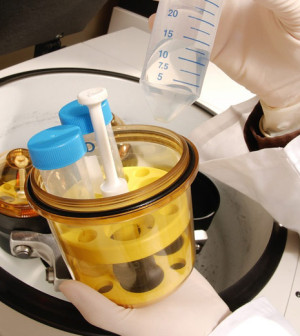- Could Your Grocery Store Meat Be Causing Recurring UTIs?
- Are You Making This Expensive Thermostat Error This Winter?
- Recognizing the Signs of Hypothyroidism
- 10 Strategies to Overcome Insomnia
- Could Artificial Sweeteners Be Aging the Brain Faster?
- Techniques for Soothing Your Nervous System
- Does the Water in Your House Smell Funny? Here’s Why
- Can a Daily Dose of Apple Cider Vinegar Actually Aid Weight Loss?
- 6 Health Beverages That Can Actually Spike Your Blood Sugar
- Treatment Options for Social Anxiety Disorder
Rely on Mom-to-Be When Epidural Is Needed


When it comes to pain relief during labor and delivery, mom probably knows best, new research suggests.
Doctors tend to be cautious about when to give the pain-relieving local anesthetic known as an epidural during labor. But, a new study says the best time to give an epidural is likely when a woman asks for it.
Researchers reviewed nine studies that included more than 15,000 first-time mothers randomly assigned to receive an epidural either early or late during childbirth. Those given early epidurals were less than 4 to 5 centimeters dilated, while those given late epidurals were 4 to 5 centimeters or more dilated.
In a normal vaginal delivery, the baby is delivered after the woman’s cervix is dilated to 10 centimeters, according to the American Pregnancy Association.
Compared to women who had late epidurals, those who had early epidurals were no more likely to require a cesarean delivery, to need assisted birth involving forceps or suction, or to spend more time in the pushing stage of labor, the investigators found.
The effect of early epidural on the length of time to reach full cervical dilation was unclear, according to the findings published Oct. 8 in The Cochrane Library.
“The right time to give the epidural is when the woman requests pain relief,” said lead researcher Dr. Ban Leong Sng, deputy head and senior consultant in the department of women’s anesthesia at KK Women’s and Children’s Hospital in Singapore.
“If they request an epidural early during their labor, the evidence we have does not provide a compelling reason why this should be refused,” Sng said in a Cochrane news release.
Previous studies have suggested that the timing of an epidural can affect the length of labor and the risk of cesarean section.
More information
The March of Dimes has more about pain relief during childbirth.
Source: HealthDay
Copyright © 2026 HealthDay. All rights reserved.










